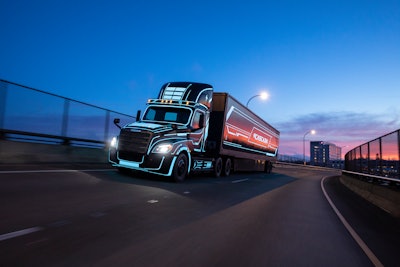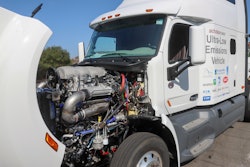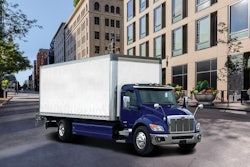
Oregon-based LTL carrier Titan Freight Systems uses 100% renewable diesel across its 45-truck regional operation, but the company will soon have six new trucks on its yard: three Class 6 and three Class 8 electric vehicles (EVs). Titan is also installing EV charging stations at its Portland location.
Titan President and CEO Keith Wilson said while electric commercial vehicles are a lower-cost operating model with a favorable return on investment, up-front costs and infrastructure challenges will prevent small operators from competing in the electric market for some time to come.
Wilson said EVs are three-and-a-half times more costly than a diesel engine vehicle, and charging stations are also expensive. Fortunately, Titan was able to obtain a grant from the Oregon Department of Environmental Quality to help offset the costs.
He said while EV adoption won’t put any operators out of business, it will be several years before smaller fleets or owner operators can afford to make the switch.
“It's going to improve efficiencies in our business. It's just a truck at the end of the day. Is the vehicle costs going to be more expensive? Yes. But it's not the vehicle cost that is the concern; it's the total annual operating cost of the vehicle, and if that is at the net no change or lower, then it's a competitive advantage to move that direction versus an overall cost increase,” Wilson said. “Can a one truck operator do this? The answer is no. The reason is because when you buy one electric truck you have to buy a gas station as well. That's the analogy because … when you buy an electric truck, it's like buying the gas station as well, because you have to have the infrastructure to charge it. A one- or two- or three-truck operator probably isn’t going to transition for a couple of decades.”
Titan will begin making the transition late this year when it expects to receive its Freightliner electric trucks from Daimler Truck North America (DTNA).
Alex Voets, e-mobility product and sales strategy manager at DTNA, said incentives like Titan received are a key driver of EV adoption, but it also presents a challenge for smaller carriers.
“Incentives are definitely the accelerator of the adoption, and incentives are available for big fleets and small fleets alike. What is a challenge for smaller fleets sometimes is to navigate that incentive landscape because every incentive is a little bit different; some incentives require certain reporting; some incentives might require certain scrappage of old vehicles, and then there's also the application process itself,” Voets said. “So it tends to be for smaller fleets that they really have to pay more attention than larger fleets that might just be privy to these incentives, at navigating that landscape. From smaller fleets, we get feedback that the incentive application needs to be as easy as possible for them to really participate at the same level.”
Fleets – no matter the size – need those incentives to help mitigate the cost of ownership, which is always higher during the early stages of adoption, he said.
Wilson said that is why the industry will see more EV adoption among smaller fleets and owner ops later on.
Wilson said Titan is going to earn income from its EVs from the grants it received, but there are other factors driving its ROI, including lower energy costs as fuel prices are on the rise (a gallon of diesel is currently almost $5.50 in the Portland-area) and lower maintenance costs as well as lower emissions, which gives his company a competitive edge to gain customers that are seeking to “go green.”
Voets said transportation is certainly an aspect that companies look at as they reach for corporate sustainability goals. Other factors that will ultimately drive trucking companies toward EV adoption, he said, include regulations as more states enact rules that mandate low- to zero-emission commercial vehicles and cost of ownership.
“The math is essentially the same that once you overcome these higher purchase prices, the cost of ownership will start going in your favor because electricity is cheaper as a road fuel than diesel, especially with what we see right now and essentially the expectation that fossil fuels will probably trade at a higher price,” Voets said.











